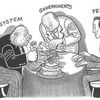12.12.2008 | 17:45
Krabbamein - glķman viš óttann.
Śtdrįttur śr grein blašakonunnar Jeanne Sather sem lést stuttu eftir aš žessi grein birtist ķ Seattle Weekly ķ desember 2003:
Running With Fear. Confessions of a breast cancer poster child by Jeanne Sather.
"My career as a breast cancer poster child began in October 1998, shortly after surgeons removed my right breast. Just a few weeks later, the first chapter of Jeanne's Diary went live on the now-defunct OnHealth Web site, with 13 more chapters to follow over the next nine months or so. I wrote each chapter in the moment—in the early morning when the whole world was asleep but me, or whenever I was overwhelmed. I wrote about my fear of chemotherapy, insurance problems, going bald (twice!), a woman in my support group who died, and about my children, who struggled with their fears that I would die.
..
FEAR: THE LIST
I live with fear. I think every cancer patient and every cancer survivor does. Ever since that first bout with breast cancer more than five years ago, the fear has been like an alien hand, sometimes squeezing my throat, making it tough to breathe, sometimes wrapping itself around my heart. We do our best to make the fear go away, with drugs if possible. And it's a brave doctor who says the "F" word—fear—to a patient. Usually, it's "anxiety" that we are coping with, or "stress." Here are my fears, large and small: Dying, of course. Leaving my children without a mother. Pain. Needles and nasty medical procedures. Being unable to support myself, or perhaps, even to brush my own teeth. Oh, the indignity of that. And, always, the constant fear that the cancer will return
WHOSE DISEASE IS THIS?
I'm the one with cancer. It's my disease, and I get to make the decisions about how I'm going to live with this disease and what treatments I will agree to do. My doctors, bless them, understand this. But many friends and family members don't. They try to tell me what I should do, despite the fact that I have never asked for their advice. One relative, who happens to sell high-priced vitamins, pushed me to add her brand of vitamins to my regimen while I was in chemotherapy. When I told her that my doctor asked me not to take vitamins during chemo, because they may interfere with its effectiveness, she said, "Doctors don't know what they are talking about." In fact, my doctor does know what he is talking about. But that's not really the point. It's my disease. I get to make the decisions. If I want to eat peach pits and douse myself with holy water from Lourdes, it's my decision. At this moment, I'm battling with a friend who thinks she knows better than I do about my life and my cancer treatment. I told my friends in an e-mail dated Oct. 1, "I do not want to discuss the treatment that I will be getting, reasons for the treatment, or anything related to that. I am satisfied with the recommendations of my doctors, and find it exhausting to talk about. . . . " Despite that message, this friend keeps trying to tell me what to do. Now you might be thinking that I should be grateful for the many friends I have who are concerned about me and want to help. Yes, I am grateful, but being badgered to revisit decisions that I made and am comfortable with is no help at all.
KEEP YOUR FEAR TO YOURSELF
This whole long article is about my fear, and how I take that fear and make lemonade out of it. I think I cope pretty well with my feelings, and I'm always available to my children, to help with whatever problems or fears they might have. But I cannot cope with other people's fear, and it's astonishing how often friends and family come to me—the person who is sick—to help them feel better about the fact that I am sick and may die soon. I have literally spent hours on the phone with my grieving friends, telling them that it's OK, that I will be fine . . . and when the conversation is over, I am exhausted. An offshoot of this is telling a person with cancer all your personal cancer horror stories. Don't do this. This is unkind. A friend reminds me that it is a common coping mechanism to automatically mention that your father or mother or brother died of cancer when confronted with someone who has the disease. And he goes on to suggest that a thoughtful friend would listen and offer support, without dumping his own cancer tragedy on someone who is sick, and in that way find comfort for his own loss.
I agree, and I'm not suggesting that the people who care about me don't need to vent their emotions, including their fear, but not to me. I can't handle it."
----------
Žessi stytti śtdrįttur fjallar um óttann og er einungis hluti af blašagreininni allri. Ef til vill birti ég fleiri śtdrętti sķšar, žvķ skrif Jeanne Sather heitinnar um višhorf krabbameinssjśklings bęši innį viš og śtį viš er bęši raunsętt og skynsamlegt - aš auki jafnvel leišbeinandi fyrir ašstandendur.

 Heimssýn
Heimssýn
 ÞJÓÐARHEIÐUR - SAMTÖK GEGN ICESAVE
ÞJÓÐARHEIÐUR - SAMTÖK GEGN ICESAVE
 Auðun Gíslason
Auðun Gíslason
 Axel Jóhann Hallgrímsson
Axel Jóhann Hallgrímsson
 Axel Þór Kolbeinsson
Axel Þór Kolbeinsson
 Ágúst H Bjarnason
Ágúst H Bjarnason
 Ásthildur Cesil Þórðardóttir
Ásthildur Cesil Þórðardóttir
 Baldur Hermannsson
Baldur Hermannsson
 Berglind Nanna Ólínudóttir
Berglind Nanna Ólínudóttir
 Bergljót Gunnarsdóttir
Bergljót Gunnarsdóttir
 Bjarni Harðarson
Bjarni Harðarson
 Björn Emilsson
Björn Emilsson
 Daníel Sigurður Eðvaldsson
Daníel Sigurður Eðvaldsson
 Einar Björn Bjarnason
Einar Björn Bjarnason
 Emil Örn Kristjánsson
Emil Örn Kristjánsson
 Erla Magna Alexandersdóttir
Erla Magna Alexandersdóttir
 Erla J. Steingrímsdóttir
Erla J. Steingrímsdóttir
 Greta Björg Úlfsdóttir
Greta Björg Úlfsdóttir
 Guðbjörn Jónsson
Guðbjörn Jónsson
 Guðmundur Ásgeirsson
Guðmundur Ásgeirsson
 Guðmundur Jónas Kristjánsson
Guðmundur Jónas Kristjánsson
 Guðni Karl Harðarson
Guðni Karl Harðarson
 Guðrún Þóra Hjaltadóttir
Guðrún Þóra Hjaltadóttir
 Guðrún Sæmundsdóttir
Guðrún Sæmundsdóttir
 Gunnar Heiðarsson
Gunnar Heiðarsson
 Gústaf Adolf Skúlason
Gústaf Adolf Skúlason
 Halla Rut
Halla Rut
 Hannes
Hannes
 Haraldur Hansson
Haraldur Hansson
 Haraldur Haraldsson
Haraldur Haraldsson
 Heimir Lárusson Fjeldsted
Heimir Lárusson Fjeldsted
 Helga Guðrún Eiríksdóttir
Helga Guðrún Eiríksdóttir
 Helga Kristjánsdóttir
Helga Kristjánsdóttir
 Helgi Þór Gunnarsson
Helgi Þór Gunnarsson
 Hildur Sif Thorarensen
Hildur Sif Thorarensen
 Hrannar Baldursson
Hrannar Baldursson
 Riddarinn
Riddarinn
 Högni Snær Hauksson
Högni Snær Hauksson
 Högni Jóhann Sigurjónsson
Högni Jóhann Sigurjónsson
 Jóhann Elíasson
Jóhann Elíasson
 Jón Valur Jensson
Jón Valur Jensson
 Jón Óskarsson
Jón Óskarsson
 Jón Ríkharðsson
Jón Ríkharðsson
 Jón Snæbjörnsson
Jón Snæbjörnsson
 Jón Svavarsson
Jón Svavarsson
 Jón Ólafur Vilhjálmsson
Jón Ólafur Vilhjálmsson
 Kolbrún Stefánsdóttir
Kolbrún Stefánsdóttir
 Kristján Jón Sveinbjörnsson
Kristján Jón Sveinbjörnsson
 Kristján P. Gudmundsson
Kristján P. Gudmundsson
 Loftur Altice Þorsteinsson
Loftur Altice Þorsteinsson
 Ólafur Th Skúlason
Ólafur Th Skúlason
 Ómar Bjarki Smárason
Ómar Bjarki Smárason
 Óskar Helgi Helgason
Óskar Helgi Helgason
 Páll Vilhjálmsson
Páll Vilhjálmsson
 Brosveitan - Pétur Reynisson
Brosveitan - Pétur Reynisson
 Ragnar L Benediktsson
Ragnar L Benediktsson
 Ragnar Þór Ingólfsson
Ragnar Þór Ingólfsson
 Ragnhildur Kolka
Ragnhildur Kolka
 Rannveig H
Rannveig H
 Sigrún Jónsdóttir
Sigrún Jónsdóttir
 Sigurbjörn Svavarsson
Sigurbjörn Svavarsson
 Sigurður Sigurðsson
Sigurður Sigurðsson
 Skattborgari
Skattborgari
 Sólveig Þóra Jónsdóttir
Sólveig Þóra Jónsdóttir
 Steingrímur Helgason
Steingrímur Helgason
 Svanur Gísli Þorkelsson
Svanur Gísli Þorkelsson
 Valan
Valan
 Þórarinn Þ Gíslason
Þórarinn Þ Gíslason
 Vefritid
Vefritid
 Vinstrivaktin gegn ESB
Vinstrivaktin gegn ESB
 Samstaða þjóðar
Samstaða þjóðar
 Samtök um rannsóknir á ESB ...
Samtök um rannsóknir á ESB ...
 Íslenska þjóðfylkingin
Íslenska þjóðfylkingin





Bęta viš athugasemd [Innskrįning]
Ekki er lengur hęgt aš skrifa athugasemdir viš fęrsluna, žar sem tķmamörk į athugasemdir eru lišin.